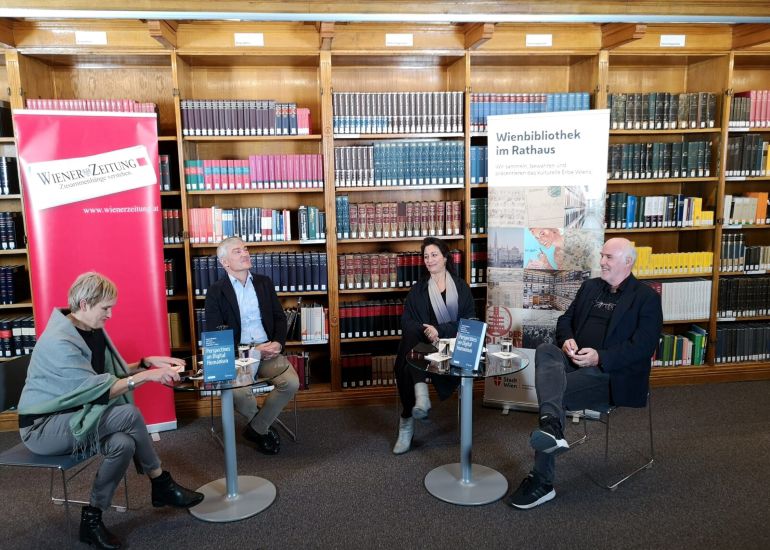Panel Discussion: “Digitaler Humanismus”
The digital transformation raises many questions. Discussion round on the relationship between man and machine.

Panel Discussion
What can I know? What should I do? What can I hope for? What is man? Will Immanuel Kant’s last question soon be answered by a machine capable of learning? The digital transformation requires us humans to contribute these answers. What such a transformation might look like was discussed at the Wienbibliothek in Vienna’s City Hall. “We have to become much more active in helping to shape this development. This can only be done with a lot of research,” says Veronica Kaup-Hasler, acting city councilor for science and culture. The public sector has a role to play here. People’s fears, such as the fear of losing personal rights through technology, must also be taken away, she adds. “There is a lack of ethical guidelines, including legal ones, and tools for this,” says the councilwoman.
Digital humanism is political, emphasizes Hannes Werthner, professor emeritus for e-commerce at the Vienna University of Technology. “Technology is a political issue and a social issue,” he says. Who decides: artificial intelligence or humans? It’s not just about the use of technology, he says, but about the question of power, including in the design and not just in the defense of rights. This concerns questions of workers’ rights as well as questions of the global division of labor or the developments toward neocolonialism – dependencies on a few companies are increasing. It is therefore a question of sovereignty and power. Who has the data? “Amazon doesn’t care what you search for. Google doesn’t care what you search. It’s about the information per se.”
How can we as humanity drive and help shape a transformation toward digital humanism? According to computer scientist and philosopher Erich Prem, the tricky thing about technology is that it looks smaller than it really is. “It has the property of intruding into our lives in a very small way and becoming quite important unnoticed.” Just think of the telephone, with which we are now monitored and tracked. And soon we’ll be getting into cars that also share data. Prem: “Anyone who believes that these changes are merely technical tools is mistaken.” It affects our lives and our being, and what we surround ourselves with.
What solutions might there be? Translatability, he says, is an important step. Erich Prem appeals to the creative people here: art could present this topic not only rationally, but also emotionally, ask questions or experiment. On the one hand, it’s about popularization, and on the other hand, it’s about penetrating the decision-making mechanisms, Werthner adds. And the examination of the topic should not stop at the level of science. It needs mediation.
Politics must encourage interdisciplinary discussion and promote large projects that work in an interdisciplinary manner, emphasizes Kaup-Hasler. In addition, the foundations are being laid for an Institute of Digital Humanism in Vienna – as a European counterforce. And the importance of promoting the communication of science, she emphasized again at the end of the event. (red)
This text was machine translated from the original german version of the Wiener Zeitung:
Video
If you watch this video, data may be transmitted to third parties.
Watch on YouTube: https://youtu.be/T7GN8cEuNQ0
Book: “Perspectives on Digital Humanism”
Hannes Werthner, Erich Prem, Edward A. Lee, and Carlo Ghezzi (eds): Perspectives on Digital Humanism, Springer, 2021.
The book comprises a collection of 46 articles from experts with different disciplinary and institutional backgrounds who provide their view on the interplay of human and machine.
Here you can find more information and open access download.

